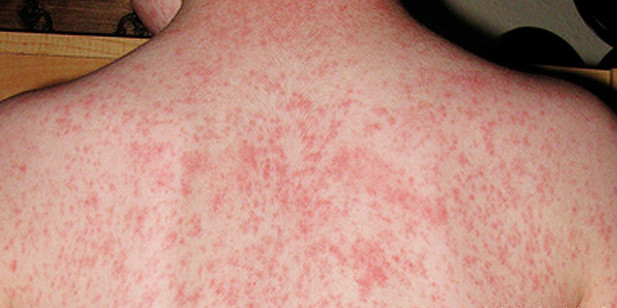This week Dr Roarty of Scally McDaid Roarty Medical Practice discusses measles and how it affects us.
With measles unfortunately in the news again in Donegal recently, it is important to know what it is and what to do.
Measles is a highly infectious viral illness which is spread via physical contact, sneezing, coughing and touching, for example, infected door handles etc..
It usually affects children but can actually occur at any age. It causes a fever, sore eyes and a runny nose with a dry cough.
Small white spots develop on the inside of the mouth and tiredness with aches, pains and a poor appetite follow.
Diarrhoea and vomiting often occur and after three or four days a red blotchy rash develops. The rash spreads from the head and neck to eventually cover most of the body before gradually fading over the next few days.
A quick internet search will give example pictures of the rash. Most children are pretty miserable for about four or five days but generally, get better in a week to ten days. However, the cough can linger for longer periods.
Usually, we only will get infected once in our lifetime as our body’s immune system produces antibodies against the measles vaccine.
How can I tell if my child has measles?
Contact your doctor’s surgery if you think your child has measles and tell the receptionist your concern. Your doctor will usually make arrangements to see your child in a way that will minimise contact with others.
The characteristic symptoms and signs usually point the way to the diagnosis but a simple saliva test is also done to confirm the diagnosis.
In this country, a team of doctors and nurses who specialise in Public Health will also become involved to help identify the origin of the infection and advise on how to minimise its spread.
Complications of measles
Common complications include eye infections (conjunctivitis) and laryngitis. Ear infections and croup may also occur and while uncomfortable and distressing for the child, they are not generally serious. Less common complications include febrile convulsions (fits) which occur in about one in two hundred children.
A full recovery usually follows, however, rarer (about one in five thousand) but more serious complications include encephalitis (inflammation of the brain) which can cause serious problems including death, as well as pneumonia and hepatitis (inflammation of the liver).
Some children may develop further brain complications years after the initial infection.
How is it treated?
As with a lot of viruses, there is no specific treatment for measles. Rest, fluids and supportive treatments to ease discomfort and reduce fevers are all that is required – e.g ibuprofen and paracetamol.
Your doctor will explain that antibiotics have no role and cough treatments do very little to help.
Your doctor will confirm the diagnosis and alert you to possible red flags to watch out for eg drowsiness, convulsions of breathing difficulty which may indicate the rarer complications. Most children recover uneventfully.
Why do we not hear much about measles nowadays?
Measles is part of the normal childhood vaccinations programme ( it is one of the “M”s in the MMR) and has thankfully become quite rare.
However, due to the decline in some areas of childhood vaccination uptake, it has raised its head again in some pockets. It is highly contagious and while the more serious complications are rare, they are potentially fatal.
Children with measles should be kept off school.
What to do if I have been in contact with someone with measles?
Certain groups of patients are more prone to complications from measles e.g. pregnant women, young babies under 12 months, immunocompromised patients ( eg on steroids, chemotherapy or HIV positive).
Certain people never received the vaccination. So if you have been in contact with someone who has had measles, especially if you are in any of the above-mentioned categories, please contact your doctor for advice.
The above information is intended as advice only and should you have any concerns please contact your own Doctor.
Dr Ciarán Roarty MB, BCh BAO MICGP DRCOG Grad. Cert. Obst. Ultrasound is a full-time GP at Scally McDaid Roarty Medical Practice, Scally Place, Letterkenny, Tel 0749164111
Tags:







